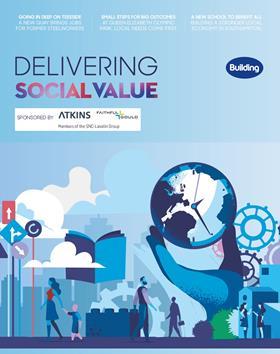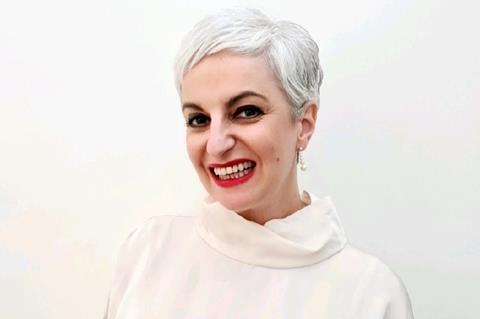Social value is out of its infancy but thereÔÇÖs a long way to go. Jordan Marshall talks to AtkinsÔÇÖ Michelle Baker and Faithful+GouldÔÇÖs Peter Masonbrook about their ambitions for the sector

Social value is still in its infancy, and we need to think about it as it being one minute past 12 in its evolution ÔÇô weÔÇÖre only there on the clock of its development,ÔÇŁ says Michell Baker, associate director for social value at Atkins.
She is quoting a speech from Professor Chris White, former member of parliament and author of the Social Value Act, at the social value summit Social Enterprise UK Birmingham in May 2022. It is an analogy she agrees with wholeheartedly, one that sums up the current state of the sector.
Her colleague Peter Masonbrook, head of social value for UK and Europe at Faithful+Gould, also feels it is an apt description of where the built environment is positioned when it comes to social value.
ItÔÇÖs about identifying the opportunities of engagement with local communities, individuals, staff and supply chain to drive aÔÇ»positive outcome
Peter Masonbrook, head of social value, Faithful+Gould
Both Baker and Masonbrook agree that although the Social Value Act was first introduced in 2012 ÔÇô a full decade ago ÔÇô rather than looking in the rear-view mirror at an apparent lack of significant progress, it is better to focus on where the sector is now, review what is working well, and consider how those lessons can be applied to future projects.
In the Delivering Social Value report, which will be published in full on 21 April, produced by ║├╔ź¤╚╔˙TV in partnership with SNC-Lavalin Atkins and Faithful+Gould, we will explore ways in which social value has been applied to various schemes at different project stages: pre-construction, in progress and post completion.
Defining and measuring
For Masonbrook the key challenge is still a misunderstanding around what exactly social value is and how to measure it effectively. On the latter point, he says it can be difficult to balance procurement requirements with finding the best social value approach for a specificÔÇ»project.
ÔÇťI think there is still confusion around what social value is and what the purpose is from that perspective,ÔÇŁ he says. ÔÇťPublic sector bodies now have to try to incorporate it into procurement, and to do that youÔÇÖve got to share; to show it in a fair and open approach ÔÇô which is what often makes it a tick-box exercise.ÔÇŁ This,ÔÇ»he points out, may not be the best way to achieve value for localÔÇ»communities.

The full Delivering Social Value report will be published in our April print and digital edition on 21 April, 2023.
The case studies will be available individually online over the next fortnight.
The report has been produced by ║├╔ź¤╚╔˙TV with Atkins and Faithful + Gould
ÔÇťIs a school engagement [to promote construction careers] more or less important than employing a local graduate? The point IÔÇÖm making is that social value is a lot more than that,ÔÇŁ saysÔÇ»Masonbrook.
ÔÇťItÔÇÖs about identifying the opportunities through engagement with local communities, stakeholders, the supply chain and our clients, to drive a positive outcome and leave lasting legacies. ThatÔÇÖs the whole purpose around social value.ÔÇŁ
Case studies
The case studies explored in the report ÔÇô a 4,500-acre redevelopment on the bank of the River Tees, a partnership with the London Legacy Development Corporation to ensure the ongoing social value provision of the 2012 Olympic Games, and the St MarkÔÇÖs School project in Southampton ÔÇô highlight the way in which approaches vary from project to project.
We need to understand that weÔÇÖre not going to change things overnight, as itÔÇÖs only been mandated into public procurement policy for aÔÇ»short period of time
Michelle Baker, associate director for social value, Atkins
Baker delves into this further, saying the sector needs to look at how it engages with the community to ensure best outcomes. ÔÇťWe really need to embrace third-sector organisations because they are doing some of the brilliant work that maybe local authorities donÔÇÖt always have the capacity to do,ÔÇŁ she says. ÔÇťThey know their communities and what the local needs and priorities are.
ÔÇťSo, if we can work with them more, thatÔÇÖs our inroad into seeing how we can work together to maximise our impact and help deliver meaningful outcomes.ÔÇŁ
Social Value Live is back for 2023, with registrations now open to the free-to-attend event.
Running across two days this yearÔÇÖs event will cover a range of topics including designing for neurodiversity, the implications of 15-minute cities, and plenty more.
Both agree that constructionÔÇÖs adversarial nature must change if we are to get the most out of our social value efforts. In the industry there is a tendency to ÔÇťnot really want to talk to our competitors around what weÔÇÖre doing in social valueÔÇŁ, says Masonbrook. ÔÇťAnd while I understand it from one perspective, the essence of social value is that itÔÇÖs collaborative ÔÇô and thatÔÇÖs how we will actually achieve really powerful outcomes.ÔÇŁ
Baker says this is why she has set up a professional services social value forum with her counterparts at rival firms ÔÇô they come together and talk about their challenges, which are often the same, and discuss different solutions.
So, what can we do to move things forward? Baker says: ÔÇťWe need to understand that weÔÇÖre not going to change things overnight, as itÔÇÖs only been mandated into public procurement policy for a short period of time. However, by working with clients to enable them to deliver additional benefits through their projects, we can help shape the social value focus to provide outcomes that support those communityÔÇÖs needs.
MICHELLE BAKER, ASSOCIATE DIRECTOR FOR SOCIAL VALUE, ATKINS

Michelle Baker has worked in the built environment for over 20 years, both in the UK and internationally, having previously held senior roles at firms including Mace and Jacobs.
Her current role is to shape, develop and lead the social value and stakeholder consultancy offering, providing strategic direction and operational service delivery for clients and internal delivery teams at Atkins.
PETER MASONBROOK, HEAD OF SOCIAL VALUE, FAITHFUL+GOULD

Peter Masonbrook has more than 30 years of procurement and supply chain experience and has worked with Faithful+Gould since 2016.
He is an advisory expert in social value, economic benefit, sustainability and ESG and undertakes optimising social value within major public and private sector projects, with past clients including London Borough of Hammersmith + Fulham, Northern Ireland Water.
He also supports the national frameworks of Scape, Pagabo and Crown Commercial Services.

























